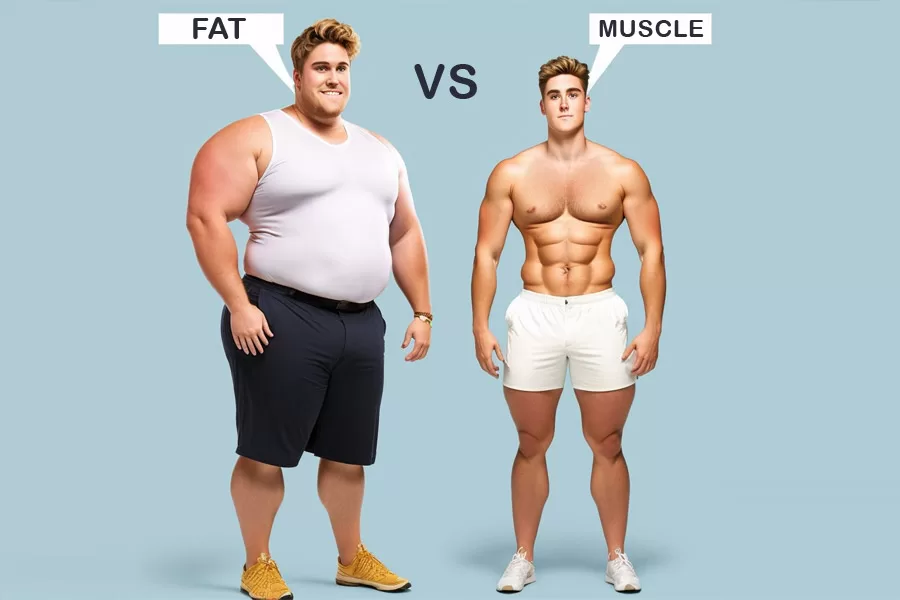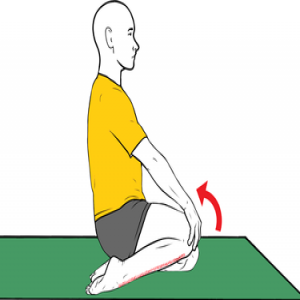Is Muscle Weight More Than Fat?
Introduction
You might have heard that fat weighs less than muscle. But a pound of fat and a pound of muscle weigh the same, according to science. Density is main the difference between the two.
Even though two objects weigh the same, their sizes can differ greatly. It will take up a lot more room to store a pound of marshmallows than a pound of steel.
The same holds for muscle and fat. A pound of fat is roughly the size of a small grapefruit, fluffy and bulky. A pound of muscle is roughly the size of a tangerine, dense, and hard.
Meaning and Characteristics
- Muscle
Our muscles give our bodies strength and help us move. They are densely packed. Their metabolism is also known to be fairly active.
- Fat
Our bodies use fat as a store for excess energy. Compared to muscle, fat is more puffed up, bulkier, and requires more space.
Fundamentals of Fat and Muscles
Maintaining skeletal muscle is essential if you want to be able to continue moving as you age because it helps control body movement. In addition to being fuel sources, muscles provide the energy required for exercise.
Increasing the tone and quality of your muscles will help you stay in a healthy weight range, move more, burn calories more quickly, prevent injuries, and support your immune system, according to research.
In addition to being an energy store, fat also supports the endocrine system, releasing hormones and proteins that control other bodily functions and organs.
Why it’s more reliable to measure Fat and Muscle than weight?
As we’ve seen, determining your weight alone is not enough to determine your health; there is more to consider when evaluating your weight-health relationship.
Even though your weight may seem high to you, it’s a positive if it indicates that you have a high muscle density.
In a similar vein, you may appear thin and weigh little, but in reality, you may be “skinny fat,” meaning that you have a lot of unhealthy visceral fat surrounding your internal organs and little muscle mass.
Therefore, start understanding your makeup and what you need to improve on rather than comparing yourself to others.
Muscle vs. Fat
| Characteristic | Muscle | Fat |
| Size | Take up less space | Take more space |
| Density | Denser | Less dense |
| Volume | Has more volume | Has less volume |
| Color | Color: Brown to yellow | Color: Red |
| Function | Generate Force Provide stability Provide support | Energy storage produce hormone Insulate organs |
| Metabolism | Burn more calories at rest | Burn fewer calories at rest |
| Cellular level | long and multinucleated | large and uninuclated |
To the misconception
Although it makes sense that a pound of fat and a pound of muscle should weigh the same, their densities vary. This indicates that five pounds of fat and five pounds of muscle would take up more volume, or space when compared side by side. That’s crucial if you’re trying to lose weight and one of your objectives is to appear lean rather than flabby.
Why, then, is it said that muscle weighs more than fat?
According to Stusek, “I find that people make this statement when they gain weight.” Someone might claim, “I’ve been working out, and I gained three pounds. The reply from a supportive friend is, “It’s all muscle.” Even though hearing this is reassuring, it isn’t realistic to expect to put on three pounds of muscle in a single week. Exercisers frequently gain muscle and lose fat without experiencing a change in body weight, so I can understand why people frequently become frustrated.
The Real Story
Dispelling the myth that muscle weighs more and is therefore unhealthy is the first step in a successful diet and exercise regimen. Stusek suggests getting rid of the scale completely.
“I try to get people to consider how their bodies have changed, how they are feeling, and how their clothes fit,” suggests Stusek, It can be challenging at times. The number on the scale shouldn’t be the only thing in focus. We wouldn’t necessarily be healthier if we just took action to lose weight.
The Advantages of Muscle
Actually, instead of seeing muscle as the adversary, nutritionists should view it as a friend.
A pound of muscle will burn more calories at rest than a pound of fat because muscle increases metabolism.
What is meant by this?
Just having more muscle will cause you to burn more calories even when you’re not exercising—you could be lounging on the couch watching TV.
Moreover, muscle has other advantages. It’s essential for boosting bone density and preventing the aging-related loss of muscle mass, which keeps people active into old age.
Strategies for Gaining muscle
Cardio exercises like walking, cycling, and jogging are unquestionably beneficial for burning calories and maintaining good health. Yet strength training is also essential. Naturally, we always consider using weights to gain muscle, and many people worry that doing so will make them “bulky,”
There are many ways to gain muscle, such as using soup cans, resistance bands, or even free weights. For optimal results, Stusek suggests working with a personal trainer to create a well-rounded, full-body workout plan. Alternatively, she advises using big weights and low repetitions if you want to bulk up. It’s also enough to do this two or three times a week, with at least one day off for muscle recovery in between.
How to Calculate Lean Muscle Mass and Body Fat Percentages?
To determine your tissue percentages, there are a few different approaches. Find the ideal one for you by reading about it.
Scales of Bioelectrical Impedance
A bioelectric impedance scale (also known as a bioimpedance scale) can be used to determine the ratio of lean muscle mass to body fat. Although many of the gadgets that make use of this technology resemble standard bathroom scales, they ace electrical impulses to determine your body composition.
The drawback of bioelectric impedance scales is that they can be challenging to accurately calibrate due to variations in water weight (due to dehydration or illness, for example) between readings. However, they can offer you a decent overview.
Body Fat Measures
Skinfold calipers, another name for body fat calipers, resemble large tweezers in many cases. They’re an additional low-cost method of calculating your body fat percentage. However, Seedman advised having a fitness expert take the reading since they will be more experienced in taking precise measurements.
Body Mass Index(BMI)
The Body Mass Index (BMI) is the only metric that matters because it’s still used by some medical professionals to determine your ideal weight.
BMI is an antiquated and skewed measure that infers body fat and, consequently, health from height and weight. This measure has numerous flaws and ignores factors such as age, race, sex, ethnicity, and body composition. The medical community nevertheless continues to use BMI despite its shortcomings since it’s a quick and low-cost method of analyzing health data.
Many doubts exist regarding its validity as a health indicator and its ability to fairly represent racial and ethnic minorities.
Although the CDC provides an online calculator to help with this, it ignores your body fat percentage, which is a major flaw in BMI calculations. Therefore, your BMI score may be misleading in indicating your current state of health if you have gained muscle mass through resistance training.
Waist Measurement

You can monitor your body fat and your risk for diseases like type 2 diabetes, heart disease, and heart attacks by taking your waist circumference.
For women who are not pregnant, a waist measurement of more than 35 inches and for men, more than 40 inches, may indicate a higher risk of obesity-related health issues. There are recommendations provided by the Centers for Disease Control and Prevention (CDC) for taking precise measurements of the waist. (Note that while this gives you an idea of your health, it doesn’t precisely tell you your body fat percentage.)
How much percentage of fat and muscle is needed in the body?
Regardless of weight or body mass index (BMI), research has shown that individuals with higher percentages of body fat die at a higher overall rate.
Being overweight raises your risk of developing ailments like:
- High blood pressure
- insulin
- heart conditions
This implies that individuals who have a low body weight but a low muscle-to-fat ratio are more susceptible to diseases associated with obesity.
Maintaining a low body fat percentage is crucial. A reliable resource for avoiding disorders linked to obesity.
That does not imply that you have to put on a lot of muscle. Although having muscle is never unhealthy and is something you can never have too much of, it’s acceptable to aim for more modest objectives.
The suggested percentages of body fat differ slightly. The American College of Sports Medicine’s guidelines, which are based on age and gender, are the source of the following recommendations provided by Vanderbilt University:
| Age | Female (% body fat) | Male (% body fat) |
|---|---|---|
| 20-29 | 16%–24% | 7%–17% |
| 30-39 | 17%–25% | 12%–21% |
| 40-49 | 19%–28% | 14%–23% |
| 50-59 | 22%–31% | 16%–24% |
| 60+ | 22%–33% | 17%–25% |
These can be further categorized using averages observed in fit, average, and obese individuals as well as athletes:
| Classification | Female (% body fat) | Male (% body fat) |
|---|---|---|
| Athletes | 14%–20% | 6%–13% |
| Fit people | 21%–24% | 14%–17% |
| Average people | 25%–31% | 18%–24% |
| People with obesity | 32% and higher | 25% and higher |
The Effect of Increased Muscle on Health
For several reasons, muscle is essential to maintaining your body’s long-term happiness and health.
To begin with, having lean muscle mass can aid in blood sugar regulation and prevent Type 2 diabetes. A 2017 study that was published in PLoS One discovered a link between Type 2 diabetes and muscle mass that is not positive.
More precisely, a higher muscle mass translated into a lower risk of Type 2 diabetes.
Moreover, the effect of regulating blood sugar is immediate and persists even after physical activity. According to Church, if you exercise today, your muscles will use blood sugar more effectively over the following 72 hours.
Better yet, muscle can increase your resting-state energy expenditure (your basal metabolic rate) and help you maintain a healthy weight.
Lastly, the muscle density may make it heavier, which also results in a reduction in body volume. This is not particularly significant in terms of health.”If someone obtains 10 pounds of muscle, many times they’ll not even notice that improvement on their body,” Seedman said, “whereas, if you gain five or 10 pounds of fat, you decide that.”
The Effects of Increase Fat on the Body
Although it’s simple to view fat as an enemy, body fat is necessary for survival and growth. In addition to generating hormones and controlling body temperature, fat tissue also supports brain function and protects vital organs.
Although fat is primarily thought of as wasted energy storage, it is really the blood’s primary carrier of indicators of inflammation.
Long-term, chronic inflammation has been linked to an illness, such as obesity, inflammatory bowel disease, Type 2 diabetes, and arthritis.
Heart issues have also been connected to high body fat percentages.”There’s a clear connection between higher levels of body fat and a higher risk for heart disease and several other health issues,” Seedman said.
Tips for Building Muscle
Try these suggestions if you’d like to bulk up a little or gain some lean muscle:
- Engage in three to four days a week of strength training exercises.
- Utilize your own weight for pushups, pullups, and squats at home.
- Use high-intensity interval training (HIIT) routines to incorporate strength training into your cardio work.
- Never be scared to challenge yourself with progressively larger free weights.
Think about working with a personal trainer who can teach you safe and efficient lifting techniques. - Think about engaging in physical activities such as climbing, yoga, or biking that promote muscle growth.
- Consume a diet rich in protein to support the growth of your muscles.
Tips for Reducing Fat
- Gaining muscle is not the only goal of weight loss. You can help yourself lose weight by using the following advice.
- Consume a diet rich in nutrients and balance. Cutting calories isn’t the only strategy for weight loss. Eating the proper amount of calories is also important. To help you feel fuller for longer, eat more fruit, vegetables, and lean protein. Cut back on or do away with empty calories found in highly processed snack foods like chips and sugary coffee or soft drinks.
- Don’t undereat. It is best to reduce calories to lose weight. However, your body may enter starvation mode if you reduce your calorie intake too much.
- Stay off the scale. Remaining off the scale can occasionally help you stay on course. This is because you won’t witness the instances where excess water weight gives the impression that you’ve put on weight. Rather, pay attention to how your clothes fit.
- Work with a dietitian. Consider consulting a nutritionist if you’ve been exercising and following a healthy diet but aren’t seeing any weight loss. They can assist you in adjusting your diet and serving sizes, which could help you lose weight more quickly.
- Change it up. Think about changing things up if you consistently consume the same foods and work out in the same ways. By doing so, you can prevent boredom and weight loss plateaus.
Summary
Both fat and muscle are vital parts of the human body. While fat stores energy, muscle is what propels us forward. But the densities of muscle and fat are different. A pound of muscle occupies less space than a pound of fat because muscle is more dense than fat. For this reason, those with higher muscle mass tend to appear leaner than those with higher fat mass.
Additionally, muscle has a higher metabolic activity than fat. This indicates that even when at rest, it burns more calories. You can maintain a healthy weight or reduce weight by doing this.
Therefore, even though muscle and fat have the same mass, they affect your body in very different ways. The benefits of muscle to your general health and fitness are greater.
FAQs
If you are muscular, do you weigh more?
Joel Seedman, Ph. D., a neuromuscular physiologist and the proprietor of Advanced Human Performance in Suwanee, Georgia, explained that muscle weighs more than fat because it is denser. Because you have more compact tissue in your hand, a fistful of muscle will weigh more than a fistful of fat.
Does muscle have greater power than fat?
On the scale, one pound of muscle is equal to one pound of fat. Because muscle has a higher density than fat, it appears harder and less “flabby” and takes up less space on the body. Greater muscle mass makes a person stronger than greater fat mass.
Why am I heavier than I look?
Muscle is denser than fat, so it takes up less space in the body even though it doesn’t weigh more than fat. A pound is still a pound. This could explain why, despite the scale remaining unchanged, you appear thinner. According to strength and conditioning coach Brandon Mentore, water weight may also be an issue.
Does gaining muscle result in fat loss?
You will be able to form much more long-term beneficial habits as a result of it.” Increasing muscle mass makes the body burn more calories because it takes more energy to maintain muscle tissue than adipose tissue, or body fat.
Reference
- De Groot, J. (2022, February 22). Muscle density vs Fat: how it affects your weight | Tanita.eu. TANITA EUROPE B.V. https://tanita.eu/blog/muscle-density-vs-fat
- Osborn, C. O. (2023, May 30). How Do Muscle and Fat Affect Weight? Healthline. https://www.healthline.com/health/does-muscle-weigh-more-than-fat#_noHeaderPrefixedContent
- Stewart, K. (2010, May 26). Myth Buster: Does Muscle Weigh More Than Fat? – Weight Center – Everyday Health. EverydayHealth.com. https://www.everydayhealth.com/weight/busting-the-muscle-weighs-more-than-fat-myth.aspx
- Bedosky, L. (2023, February 7). Does Muscle Weigh More Than Fat? It’s Complicated. Health. https://www.health.com/fitness/does-muscle-weigh-more-than-fat
- Toshi, N. (2023, August 1). Debunking the Myth: Does Muscle Weigh More than Fat? PharmEasy Blog. https://pharmeasy.in/blog/debunking-the-myth-does-muscle-really-weigh-more-than-fat/






